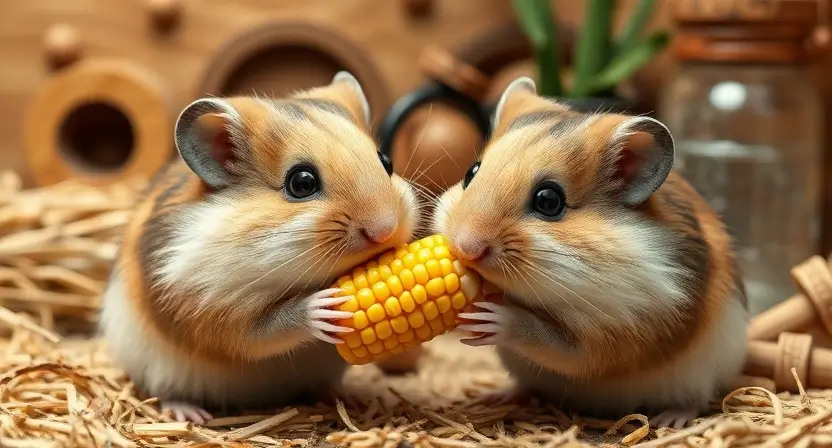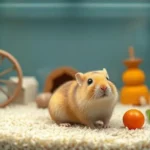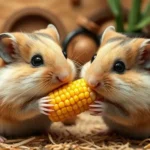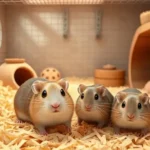Your gerbil’s diet plays a crucial role in its overall health and happiness. As a pet owner, you might wonder, can gerbils eat corn? The short answer is yes, but only under certain conditions.
Corn can be a nutritious and tasty addition to your gerbil’s diet, but it needs to be offered thoughtfully. Feeding your gerbil the right type and amount of corn can provide beneficial nutrients, but overdoing it or serving it improperly can lead to health risks..
Nutritional Profile of Corn
Corn is not just a popular snack for humans; it also offers valuable nutrients for animals, including gerbils. Here’s what makes corn a good dietary option:
Nutritional Value of Corn (Per 100g)
Corn is a nutritious food that provides energy, vitamins, and minerals. Below is a breakdown of its nutritional content:
| Nutrient | Amount per 100g | Daily Value (%) |
|---|---|---|
| Calories | 96 kcal | 5% |
| Carbohydrates | 21 g | 7% |
| Protein | 3.4 g | 7% |
| Fat | 1.5 g | 2% |
| Fiber | 2.4 g | 9% |
| Sugar | 4.5 g | – |
| Vitamin C | 6.8 mg | 8% |
| Vitamin B6 | 0.1 mg | 5% |
| Magnesium | 37 mg | 9% |
| Potassium | 270 mg | 8% |
Carbohydrates for Energy
Corn is rich in carbohydrates, which provide your gerbil with a quick and lasting source of energy. This is particularly beneficial for active pets that need to burn energy throughout the day.
Dietary Fiber
Fiber in corn helps support your gerbil’s digestive system, promoting regular bowel movements and preventing common issues like constipation.
Essential Vitamins
Corn contains vitamin B6 and folate, which aid in metabolic processes and support healthy brain function. The small amounts of vitamin C found in fresh corn can also strengthen their immune system.
Minerals
Minerals such as magnesium and potassium are present in corn. These nutrients help regulate muscle function and maintain a healthy heart.
While corn offers many health benefits, remember that it is best served as part of a balanced diet. Feeding corn alone won’t meet your gerbil’s diverse nutritional needs.
Types of Corn for Gerbils
When it comes to feeding corn to your gerbil, not all forms are created equal. Here’s a breakdown of the types of corn you can offer and how to do so safely:
1. Fresh Corn

Fresh corn is one of the best options for your gerbil. It is full of natural moisture and nutrients, making it a hydrating and flavorful snack.
Serving Tips:
Remove the kernels from the cob to avoid choking hazards.
Wash the kernels thoroughly to eliminate dirt and pesticides.
Offer only a small amount, as fresh corn is rich and could cause digestive discomfort if overfed.
2. Dried Corn
Dried corn is often included in commercial gerbil food mixes and serves as a crunchy, satisfying treat.
Benefits:
Promotes dental health by helping gerbils wear down their constantly growing teeth.
Caution:
Too much dried corn can contribute to weight gain due to its high caloric content. Feed sparingly.
3. Baby Corn
Baby corn is another safe and healthy option for gerbils. It is lower in starch than mature corn and easier for small pets to handle.
Why Baby Corn?
It is nutrient-rich and low in fat, making it a better choice for portion control.
Fresh baby corn is preferable over canned, as canned varieties often contain preservatives or salt.
4. Popcorn
Popcorn can be an exciting treat for your gerbil if prepared correctly.
How to Serve:
Use plain, air-popped popcorn without butter, salt, or any added flavorings.
Offer small, bite-sized pieces.
Each type of corn has its pros and cons, but the key is moderation. Feeding a variety of corn options occasionally can keep your gerbil interested while providing essential nutrients.
Also read: Can Gerbils Eat Coconut?
Risks of Feeding Corn to Gerbils
While corn can be a healthy addition to your gerbil’s diet, it’s essential to understand the risks associated with feeding it improperly. Here’s what you should watch out for:
1. Digestive Issues
Feeding too much corn can upset your gerbil’s digestive system. Corn is starchy, and overconsumption can lead to bloating, gas, or diarrhea. To avoid this, always provide small portions and observe how your pet reacts.
2. Choking Hazards
Corn kernels, especially dried ones, can pose a choking risk for gerbils. This is particularly true for kernels left on the cob. Always remove kernels and break them into smaller, manageable pieces.
3. Weight Gain and Obesity
Corn is calorie-dense, and if given too frequently, it can contribute to excessive weight gain. Obesity in gerbils can lead to other health problems, including difficulty moving and an increased risk of heart disease.
4. Mycotoxin Contamination
Improperly stored corn can develop mold, which produces harmful toxins (mycotoxins). These toxins are dangerous for gerbils and can cause severe health issues. Always inspect corn for signs of spoilage and store it in a dry, cool place.
Key Takeaway: While corn is generally safe, its risks highlight the importance of moderation and careful preparation. Being mindful of these factors ensures your gerbil enjoys the benefits without any harm.
Serving Corn Safely to Gerbils

Feeding corn to your gerbil requires some preparation to ensure it’s both safe and enjoyable. Follow these tips for proper serving:
1. Clean Thoroughly
Before offering any corn, wash it thoroughly to remove dirt, pesticides, and any potential bacteria. For fresh corn, this step is especially crucial.
2. Remove Kernels from the Cob
While gerbils can nibble on the cob, it’s better to remove the kernels to prevent choking or overconsumption. You can serve the kernels raw, fresh, or dried, depending on your pet’s preference.
3. Portion Sizes
A gerbil’s diet should consist mostly of high-quality pellets, seeds, and hay. Corn should only make up about 5–10% of their weekly diet. Offer no more than a teaspoon of kernels per serving.
4. Frequency
Corn is best served as an occasional treat rather than a daily staple. Feeding it once or twice a week ensures your gerbil benefits from the nutrients without risking health problems.
5. Watch for Reactions
After introducing corn, monitor your gerbil for any signs of intolerance or allergies. Symptoms like diarrhea, lethargy, or a lack of appetite could indicate that corn doesn’t agree with them.
By following these steps, you can make corn a safe and enjoyable addition to your gerbil’s diet.
Balancing Corn with a Healthy Diet
Corn should never replace the foundational elements of your gerbil’s diet. To keep your furry friend healthy and happy, balance corn with other nutritious options.
1. Include a Variety of Foods
Gerbils thrive on a diverse diet. In addition to corn, incorporate fresh vegetables like carrots and broccoli, leafy greens like spinach, and occasional fruits like apples (without seeds). These provide a range of vitamins and minerals.
2. Focus on High-Quality Pellets and Seeds
A high-quality gerbil food mix should form the bulk of your pet’s diet. These mixes are specially formulated to meet their nutritional needs, ensuring a balanced intake of proteins, fats, and carbohydrates.
3. Offer Healthy Treats
Aside from corn, consider giving your gerbil small amounts of sunflower seeds, oats, or millet. These treats provide variety and keep your pet mentally stimulated.
4. Avoid Overfeeding Treats
While treats like corn add excitement to your gerbil’s meals, overfeeding them can lead to nutrient imbalances and health problems. Stick to the recommended portion sizes.
Key Tip: Think of corn as a fun, occasional snack rather than a diet staple. A balanced diet ensures your gerbil gets the nutrients they need for a long and healthy life.
Alternatives to Corn for Gerbils
While corn can be a safe and nutritious treat, offering alternatives helps diversify your gerbil’s diet and prevents over-reliance on any one food. Here are some excellent options to include in your gerbil’s menu:
1. Vegetables
Gerbils love crunchy, nutrient-packed veggies that provide essential vitamins and hydration.
Carrots: A sweet, crunchy snack full of beta-carotene.
Broccoli: Offers fiber and vitamin C, but serve in small portions to prevent gas.
Cucumbers: Hydrating and low-calorie, perfect for a refreshing treat.
2. Fruits
Though high in sugar, fruits are delightful occasional treats.
Apples: Remove seeds and offer small slices.
Blueberries: Packed with antioxidants and a natural sweetness gerbils enjoy.
Pears: Another hydrating option; ensure it’s fresh and seedless.
3. Seeds and Grains
A natural part of a gerbil’s diet, seeds and grains provide essential fats and energy.
Sunflower Seeds: High in fat, so serve sparingly.
Pumpkin Seeds: Nutrient-rich and excellent for dental health.
Millet: A favorite among gerbils for its taste and small size.
4. Protein Sources
Gerbils occasionally need protein for growth and repair.
Cooked Egg: A tiny piece of boiled egg provides high-quality protein.
Mealworms: A natural source of protein that mimics their wild diet.
Offering a mix of these alternatives alongside corn ensures your gerbil gets a balanced, exciting diet.
Common Mistakes When Feeding Corn to Gerbils
Even with good intentions, mistakes in feeding corn can lead to health problems for your gerbil. Here’s what to avoid:
1. Feeding Too Much Corn
Corn is calorie-dense and should only be an occasional treat. Overfeeding can lead to obesity, digestive issues, and imbalanced nutrition. Stick to small portions, and limit feeding to once or twice a week.
2. Using Canned or Processed Corn
Canned corn often contains added salt, sugar, or preservatives, which can harm your gerbil. Always opt for fresh or dried corn without additives.
3. Leaving Corn on the Cob
While some gerbils enjoy nibbling on a cob, it can lead to overconsumption or choking hazards. Always remove the kernels before serving.
4. Not Cleaning Corn Thoroughly
Unwashed corn can carry pesticides or dirt that may harm your pet. Always wash fresh corn under running water before offering it.
5. Ignoring Signs of Food Intolerance
Not all gerbils will react positively to corn. If you notice symptoms like diarrhea, lethargy, or loss of appetite after feeding corn, stop immediately and consult a vet if symptoms persist.
FAQs
Can Gerbils Eat Raw Corn?
Yes, gerbils can eat raw corn. It’s nutrient-rich and easy for them to chew. Just ensure it’s fresh, washed, and served in small amounts.
Can Gerbils Eat Corn on the Cob?
While gerbils can chew corn on the cob, it’s safer to remove the kernels and serve them separately to avoid choking or overeating.
Is Dried Corn Safe for Gerbils?
Yes, dried corn is safe and often found in commercial gerbil food mixes. However, it’s calorie-dense, so feed it sparingly to prevent weight gain.
Can Gerbils Eat Popcorn?
Yes, gerbils can eat plain, air-popped popcorn. Ensure it’s free of butter, salt, or flavorings, as these can harm your pet.
How Often Should I Feed Corn to My Gerbil?
Corn should be an occasional treat, served no more than once or twice a week in small portions to avoid digestive issues and obesity.
What Should I Do If My Gerbil Eats Too Much Corn?
Monitor your gerbil for signs of digestive upset, such as diarrhea or lethargy. Reduce corn intake and focus on their regular diet to restore balance.











